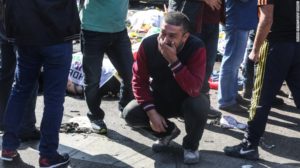By Shannon Emmett
A dark shadow has been cast across the celebration of Ramadan this month as multiple Middle Eastern countries suffer from terror attacks. Though not all of the attacks have been claimed by ISIS, the attacks follow a similar pattern, and exemplify ISIS’s announcement to wreak terror during the holy holiday.
Beginning in Jordan on June 21 with a suicide car bombing that killed four people, attacks have occurred in Lebanon, Yemen, Turkey, Bangladesh, Iraq, Kuwait, and Saudi Arabia, all within the celebration of Ramadan. ISIS took responsibility for the attack in Jordan, where 3 national security officials and a civil defense worker were killed.
5 suspects were arrested in Lebanon in relation to a suicide bombing conducted by individuals wearing explosive vests. The act of terror occurred on June 27 in Qaa village, which is located near the Syrian border in North Lebanon, and is a predominantly Christian village. The attack sent a strong, devastating message as 6 were killed and 19 were injured. The suspects have so far admitted to previous attacks against Lebanon’s army. Fortunately, two other additional attacks were evaded by the Lebanese Army.
On the same day, 42 were killed in a string of terror attacks in Mukalla, Yemen- three of which occurred at military checkpoints and the fourth at a military compound. The casualties consisted mostly of soldiers, but one child’s life was lost as he walked by a military checkpoint when explosives in cars nearby detonated. Additionally, 30 were injured, 5 of whom were civilians. These attacks were claimed by Amaq, an agency of ISIS.
In Turkey the following day, an attack resembling the act of terror in Brussels occurred at the Ataturk Airport, killing 44 and leaving hundreds more injured. Given the resemblance of the attack to the Brussels attack by ISIS in March, it is suspected that ISIS is responsible. Thirteen suspects have been charged for the deadly gun and bomb violence at the airport.
Striking at the end of the day on Friday, when fast is broken during Ramadan, 7 gunmen held 20 people hostage in a cafe in Dhaka, located in Bangladesh. Hostages were held overnight for 11 hours before police finally raided the cafe to end the siege, rescuing 14 hostages. Of the gunmen, 6 were shot and killed by police at the scene, while 1 was captured alive. Customers at the restaurant who became hostages that night were from all over the world, including Italy, Japan, India, Bangladesh, and the U.S. Though the gunmen could be considered homegrown terrorists, they claim relation to ISIS.
A suicide truck bomb caused the deadliest terror attack in Iraq since the 2003 U.S. invasion, killing at least 200 in a neighborhood in Baghdad known as Karrada. Again, the attack was during the daily break fast of Ramadan, when a truck was driven into a building complex, home to shops, a cafe, and a gym.
Most recently, Saudi Arabia suffered multiple suicide bombings through Monday. Two failed attacks were intended to occur in Jeddah at the U.S. Consulate, as well as at a Shiite Mosque in Qatif. An attack was carried out, however, in the holy city of Medina, where 4 were killed.
These deadly attacks throughout the celebration of Ramadan, claimed by ISIS or so far otherwise, are alarming in number, as well as in death toll. It is hopeful that attacks of the like will slow as Ramadan comes to a close, but ISIS has undoubtedly followed through on its threat of terror during the Islamic holiday.

